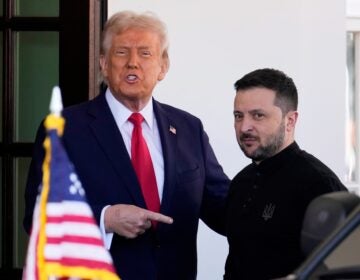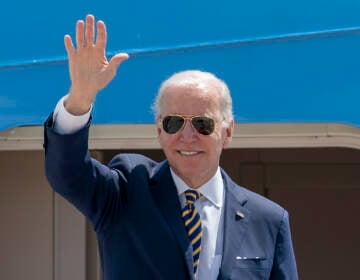Biden in Poland says U.S. and allies ‘have Ukraine’s back’
He warned that there were “hard and bitter days ahead,” but pledged that the United States and its allies would “have Ukraine’s back” as the war enters its second year.
President Joe Biden, returning on Tuesday to the Polish castle where he spoke shortly after the Russian invasion of Ukraine last year, said the war had hardened Western resolve to defend democracy around the globe.
He warned that there were “hard and bitter days ahead,” but pledged that the United States and its allies would “have Ukraine’s back” as the war enters its second year.
“Democracies of the world will stand guard over freedom today, tomorrow and forever,” he said at the Royal Castle, a historical landmark in Warsaw, before a cheering crowd of Polish citizens and Ukrainian refugees.
Biden’s speech came one day after his daring, unannounced trip to Kyiv, where he met with Ukrainian President Volodymyr Zelenskyy.
“Kyiv stands strong,” Biden declared. “Kyiv stands proud.”
Before his speech, Biden met with Polish President Andrzej Duda as he began a series of consultations with allies to prepare for an even more complicated stage of Russia’s invasion.
“We have to have security in Europe,” Biden said at the presidential palace in Warsaw. “It’s that basic, that simple, that consequential.”
He described NATO as “maybe the most consequential alliance in history,” and he said it’s “stronger than it’s ever been” despite Russian President Vladimir Putin’s hopes that it would fracture over the war in Ukraine.
Earlier Tuesday, Putin announced that Moscow would suspend its participation in the last remaining nuclear arms control pact with the United States.
The so-called New START Treaty caps the number of long-range nuclear warheads they can deploy and limits the use of missiles that can carry atomic weapons.
Biden laid into Putin throughout speech, but did not mention the START suspension.
Duda, in his meeting with Biden, praised the American president’s unannounced visit to Kyiv as “spectacular,” saying it “boosted morale of Ukraine’s defenders.”
He said the visit was “a sign that the free world, and its biggest leader, the president of the United States, stands by them.”
On Wednesday, Biden plans to meet again with Duda along with other leaders of the Bucharest Nine, a group of the easternmost members of NATO military alliance.
The conflict in Ukraine — the most significant war in Europe since World War II — has already left tens of thousands of people dead, devastated Ukraine’s infrastructure system and damaged the global economy.
While Biden is looking to use his whirlwind trip to Europe as a moment of affirmation for Ukraine and allies, the White House has also emphasized that there is no clear endgame to the war in the near term, and the situation on the ground has become increasingly complex.
President Joe Biden, returning on Tuesday to the Polish castle where he spoke shortly after the Russian invasion of Ukraine last year, said the war had hardened Western resolve to defend democracy around the globe.
He warned that there were “hard and bitter days ahead,” but pledged that the United States and its allies would “have Ukraine’s back” as the war enters its second year.
“Democracies of the world will stand guard over freedom today, tomorrow and forever,” he said at the Royal Castle, a historical landmark in Warsaw, before a cheering crowd of Polish citizens and Ukrainian refugees.
Biden’s speech came one day after his daring, unannounced trip to Kyiv, where he met with Ukrainian President Volodymyr Zelenskyy.
“Kyiv stands strong,” Biden declared. “Kyiv stands proud.”
Before his speech, Biden met with Polish President Andrzej Duda as he began a series of consultations with allies to prepare for an even more complicated stage of Russia’s invasion.
“We have to have security in Europe,” Biden said at the presidential palace in Warsaw. “It’s that basic, that simple, that consequential.”
He described NATO as “maybe the most consequential alliance in history,” and he said it’s “stronger than it’s ever been” despite Russian President Vladimir Putin’s hopes that it would fracture over the war in Ukraine.
Earlier Tuesday, Putin announced that Moscow would suspend its participation in the last remaining nuclear arms control pact with the United States.
The so-called New START Treaty caps the number of long-range nuclear warheads they can deploy and limits the use of missiles that can carry atomic weapons.
Biden laid into Putin throughout speech, but did not mention the START suspension.
Duda, in his meeting with Biden, praised the American president’s unannounced visit to Kyiv as “spectacular,” saying it “boosted morale of Ukraine’s defenders.”
He said the visit was “a sign that the free world, and its biggest leader, the president of the United States, stands by them.”
On Wednesday, Biden plans to meet again with Duda along with other leaders of the Bucharest Nine, a group of the easternmost members of NATO military alliance.
The conflict in Ukraine — the most significant war in Europe since World War II — has already left tens of thousands of people dead, devastated Ukraine’s infrastructure system and damaged the global economy.
While Biden is looking to use his whirlwind trip to Europe as a moment of affirmation for Ukraine and allies, the White House has also emphasized that there is no clear endgame to the war in the near term, and the situation on the ground has become increasingly complex.
The administration on Sunday revealed it has new intelligence suggesting that China, which has remained on the sidelines of the conflict, is now considering sending Moscow lethal aid. Secretary of State Antony Blinken said it could become a “serious problem” if Beijing follows through.
Biden and Zelenskyy discussed capabilities that Ukraine needs “to be able to succeed on the battlefield” in the months ahead, Sullivan said. Zelenskyy has been pushing the U.S. and European allies to provide fighter jets and long-range missile systems known as ATACMS — which Biden has declined to provide so far. Sullivan declined to comment on whether there was any movement on the matter during the leaders’ talk.
With no end in sight for the war, the anniversary is a critical moment for Biden to try to bolster European unity and reiterate that Putin’s invasion was a frontal attack on the post-World War II international order. The White House hopes the president’s visit to Kyiv and Warsaw will help bolster American and global resolve.
In the U.S., a poll published last week by The Associated Press-NORC Center for Public Affairs Research shows that support for providing Ukraine with weapons and direct economic assistance is softening. And earlier this month, 11 House Republicans introduced what they called the “Ukraine fatigue” resolution urging Biden to end military and financial aid to Ukraine, while pushing Ukraine and Russia to come to a peace agreement.
Biden dismissed the notion of waning American support during his visit to Kyiv.
“For all the disagreement we have in our Congress on some issues, there is significant agreement on support for Ukraine,” Biden said while in Kyiv. He described the conflict as “about freedom of democracy at large.”
Ahead of the trip, the White House spotlighted Poland’s efforts to assist Ukraine. More than 1.5 million Ukrainian refugees have settled in Poland since the start of the war and millions more have crossed through Poland on their way to other countries. Poland has also provided Ukraine with $3.8 billion in military and humanitarian aid, according to the White House.
The Biden administration announced last summer that it was establishing a permanent U.S. garrison in Poland, creating an enduring American foothold on NATO’s eastern flank.
“The truth of the matter is the United States needs Poland and NATO as much as NATO needs the United States,” Biden told Duda on Tuesday.
___
Miller and Megerian reported from Washington. Associated Press writers Monika Scislowska in Warsaw, Evan Vucci in Kyiv and Kevin Freking in Washington contributed to this report.
WHYY is your source for fact-based, in-depth journalism and information. As a nonprofit organization, we rely on financial support from readers like you. Please give today.




